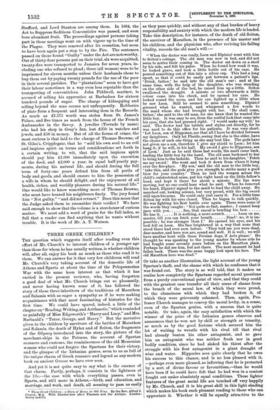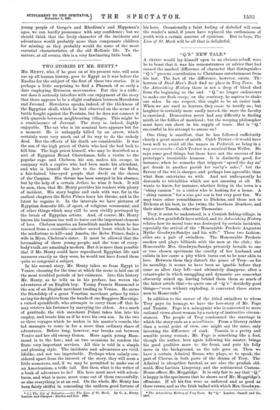THREE GREEK CHILDREN.*
THE question which suggests itself after reading even this effort of Mr. Church's to interest children of a younger age than those for whom he has usually written, is whether children will, after all, enjoy his book as much as those who read it to them. We can answer for it that very few childeren will read Mr. Church's very taking account of the domestic life of Athens and Sparta at about the time of the Peloponnesian War with the same keen interest as that which it has excited in the present reviewer, who, having forgotten a good deal of what Mr. Church brings out so pleasantly, and never having known some of it, has followed the story of these three inheritors of the traditions of Marathon and Salamis with as eager a sympathy as if he were making acquaintance with that most fascinating of histories for the first time. We could have spared, indeed, a little of the chapter on " Reading, Writing, and Arithmetic," which reminded us painfully of Miss Edgeworth's "Harry and Lucy," and Mrs. Barbauld's " Tutor, George, and Harry." But the narrative given to the children by survivors of the battles of Marathon and Salamis, the death of Hylax and of Sciton, the fragments of the Odyssey introduced into the story, the picture of the merchant-ships in the Peineus, the account of Spartan manners and customs, the reminiscences of the old Messenian woman who could not forgive the Spartans for their victory, and the glimpse of the Isthmian games, seem to us as full of the unique charm of Greek romance and legend as any modem book on ancient Greece we have ever seen.
And yet it is not quite easy to say what is the essence of that charm. Partly, perhaps, it consists in the lightness of the life,—the ease with which everything passes, even in Sparta, and still more in Athens,—birth, and education, and marriage, and work, and death, all seeming to pass as easily
• Three Greek Children : a Story of Home in Old Time. By the Rev. Alfred J. Church, M.A. With Illustrations after Flaxman and the Antique. London: Seeley and Co.
as they pass quickly, and without any of that burden of heavy responsibility and anxiety with which the modern life is loaded. Take this description, for instance, of the death of old Sciton, the survivor of Marathon, in the presence of his master and his children, and the physician who, after reviving his failing vitality, records the old man's will :—
" When the doctor was ready, Leon and Elpinice went with him to Sciton's cottage. The old man was now in bed, and did not seem to notice their coming in. The doctor sat down on a stool by his side, and felt his pulse. When he found how weak it was, he looked grave, and took a little bottle out of his case. He poured something out of this into a silver cup. This had a long spout, so that it could be easily put between a patient's lips. Drink, father,' he said into the old man's ear ; and at the same time, with the help of the daughter, who was standing on the other side of the bed, he raised him up a little. Sciton swallowed the draught. A minute or two afterwards a little colour came into his cheek, and he opened his eyes. He looked round the room, and his eye lighted up a little when he saw Leon. Still he seemed to miss something. Elpinice guessed what he wanted, and whispered a few words to the maid whom she had brought with her. He shall come, father,' she said to the old man, for she knew that he wanted the little boy. It was easy to see, from the restful look that came into his eyes, that she had guessed right. I would make my will,' he said. The doctor had his tablets and stylus out directly, for he was used to do this office for his patients. It was very short. Let Leon, son of Hipponax, see that all I have be divided between my daughters. Only let Pheido, seeing that she is the elder, have the choice of such one thing as she may best like. The gods have not given me a son, therefore I give my shield to Leon ; let him hang it, if he will, in his hall. My sword I give to Hipponax, son of Leon.' Just as he said these last words, the maid came back, leading the little boy by the hand. The old man beckoned to her to bring him to the bedside. Then he said to his daughter, Fetch me my sword.' She went and took it down from where it hung over the fire-place. My son,' said the old man to the little boy, take this, and the gods give you strength to strike many a good blow for your country.' Then he laid the weapon across the child's outstretched arms, put his right hand on the little fellow's head, and kept it there for about a minute. His lips were moving, but no one could hear what he said. When he removed his hand, Elpinice signed to the maid to lead the child away. He marched out, looking solemn, but very proud, with the big sword still upon his arms. He could only just carry it. For a little time Sciton lay with his eyes closed. Then he began to talk quickly. He was fighting his first battle over again. These were some of the words they caught : Not quite so fast, master ; I cannot keep
pace with you See, that rascal is bending his bow He has it It is nothing, a mere scratch Lean on me,
master, till you can fetch your breath Dead ! no, it is im- possible ; he was stronger than I.' He opened his eyes, and his look fell on Leon. His face brightened in a way that none that stood there had ever seen before. They told me you were dead, dear master, and here you are, sound and well. It is well ; we will have another bout with these Persian dogs, if Ares please.' He thought he was speaking to the young master by whose side he had fought some seventy years before on the Marathon plain. Perhaps he did see him, but not there. The next moment he had fallen back. There was the same happy look upon his face. The old Marathon hero was dead."
Or take as another illustration, the light account of the young Spartan's theft, and the shame with which he confesses that it was found out. The story is so well told, that it makes us realise how completely the Spartans regarded moral questions from a purely conventional point of view, and that they could with the greatest ease transfer all their sense of shame from the breach of the moral law, of which they were proud, to the clumsiness with which they had broken it, of which they were grievously ashamed. Then, again, Pro- fessor Church manages to convey the moral levity, in a sense, even of the Spartan genius, with a success that is quite notable. Or take, again, the easy satisfaction with which the winner of the prize of the Isthmian games observes and announces that he won not• by skill or strength or tenacity, so much as by the good fortune which secured him the lot of waiting to wrestle with his rival till that rival had already beaten his other antagonist, and so gave him an antagonist who was neither fresh nor in good bodily condition, since he had slaked his thirst after the struggle with his first antagonist in a giant draught of wine and water. Hippocles sees quite clearly that he owes his success to this chance, and is no less pleased with it, —perhaps even more pleased, as inferring that he is protected by a sort of divine favour or favouritism,—than he would have been if he could have felt that he had won in a contest fought out under absolutely equal conditions. These lighter features of the great social life are touched off very happily by Mr. Church, and it is his great skill in this light shading which makes his book such pleasant reading to those who can appreciate it. Whether it will be equally attractive to the
young people of Gorgo's and Rhodium's and Hipponax's ages, we can hardly pronounce with any confidence; but we should think that the lively character of the incidents and adventures would probably more than compensate children for missing, as they probably would do, some of the most essential characteristics of the old Hellenic life. To the mature, at all events, this is a very fascinating little book.



















































 Previous page
Previous page